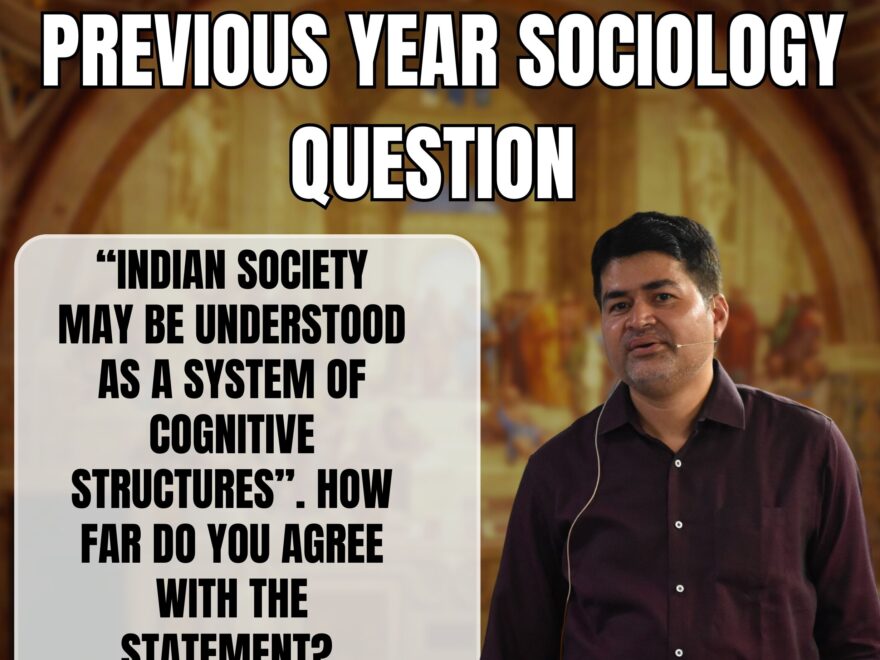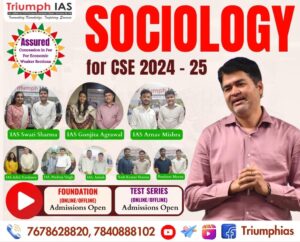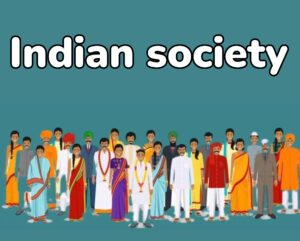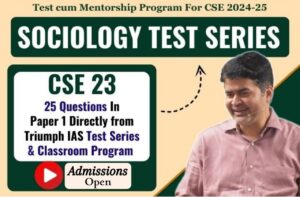Indian society may be understood as a system of cognitive structures. How far do you agree with the statement
Section: A
Sociology Paper 2012.
Relevant for Sociology Optional for Civil Services Examination.
Paper 2: Unit-12 Social Structure; caste system : Louis Dumont
Question: Indian society may be understood as a system of cognitive structures. How far do you agree with the statement
– 20 Marks
Introduction: Brief idea of Dumont’s Analysis in Homo HierarchicusMain Body: Dumont’s Explanation of Idea of Cognitive Structures and Criticism of his Idea of Cognitive Structures.Conclusion: Contribution to Indian Sociological Thought. |
Introduction:
This perspective is based on Dumont’s analysis of caste and social hierarchy in India, primarily outlined in his seminal work “Homo Hierarchicus. The Caste System and Its Implications.” Dumont’s approach to understanding Indian society is characterized as a “cognitive historical view.” He sees Indian society not just as a system of relationships but as one of ideation, value patterns, or cognitive structures. This perspective emphasizes the importance of understanding the cognitive elements that shape social behaviour and institutions.
Main Body:
Dumont’s explanation of idea of cognitive structures
- Cognitive Structures in Caste System: Dumont argued that the Indian caste system is fundamentally a reflection of cognitive structures, where hierarchy and purity/pollution are central to how individuals and groups perceive themselves and their relationships with others. This cognitive framework is deeply ingrained in the Indian social psyche.
- Reactions to Western Culture: Dumont highlights the importance of studying how Indian society reacts to the influence of Western culture, particularly in terms of Western cognitive elements such as egalitarianism, individualism, freedom, and democracy. He suggests that Indian society’s cognitive system responds to these influences through either rejection or acceptance.
- Holistic Approach: Dumont’s approach to understanding Indian society emphasizes the holistic nature of its cognitive structures. He contends that Western societies tend to compartmentalize social domains (e.g., religion, politics, economics), whereas Indian society integrates them within a single, overarching system of values.
- Ideology of Impurity: Dumont underscores the importance of understanding the ideology of impurity in the caste system. He believes that it is essential to comprehend the cognitive elements that underlie concepts of purity and impurity, as they are reflected in classical texts and historical examples.
- Division of Labor and Marriage: Dumont discusses the traditional division of labor (jajmani system) and marriage regulations within the caste system. He argues that these aspects are influenced more by religious values than economic logic.
- Value of the Whole vs. Individualism: Dumont highlights the contrast between individualism in Western societies and the importance of the whole (i.e., the society or the community) in Indian society. He argues that Indian society’s cognitive structures emphasize collective well-being over individual autonomy.
Critics of Dumont’s Theory:
- Overemphasis on Hierarchy: Critics argue that Dumont’s focus on hierarchy and purity/pollution may oversimplify the complexity of Indian society. While these aspects are undoubtedly important, they do not capture the full spectrum of India’s social, cultural, and historical diversity.
- Static View: Some critics argue that Dumont’s framework tends to portray Indian society as static and unchanging, which doesn’t account for the dynamism and evolution seen in Indian society over time.
- Oversimplification of Western Society: Critics contend that Dumont’s comparison between Indian and Western societies can sometimes oversimplify the latter. Western societies also have complex cognitive structures and values that vary across different regions and historical periods.
- Neglect of Regional Variation: India is a vast and diverse country with significant regional variations in social structures, practices, and values. Dumont’s theory may not adequately account for these regional differences.
- Ethnocentrism: Some scholars argue that Dumont’s theory reflects a Eurocentric bias by framing Western individualism as the norm against which Indian society is measured.
- Inadequate Treatment of Economic Factors: Dumont’s framework is often criticized for downplaying economic factors in understanding social hierarchies. Economic disparities and the role of class are considered crucial by many scholars in explaining Indian society.
Conclusion:
While Louis Dumont’s theory of Indian society as a system of cognitive structures has made significant contributions to the study of caste and social hierarchy in India, it is not without its limitations and controversies. Whether one agrees with the statement largely depends on their perspective and the emphasis they place on hierarchy, purity, and collective values in understanding Indian society. It is essential to consider Dumont’s work as one among various theoretical frameworks and to recognize the diversity and complexity of Indian society beyond a single cognitive structure.
Related Blogs …
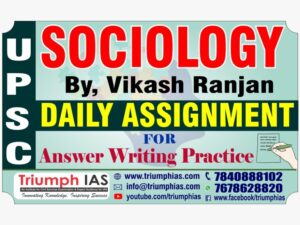 |
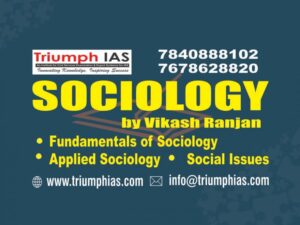 |

To master these intricacies and fare well in the Sociology Optional Syllabus, aspiring sociologists might benefit from guidance by the Best Sociology Optional Teacher and participation in the Best Sociology Optional Coaching. These avenues provide comprehensive assistance, ensuring a solid understanding of sociology’s diverse methodologies and techniques.
META TAGS:
Heritage Tourism, heritage tourism in india, heritage tourism upsc, Urban Development, Socio-Spatial Patterns, Cultural Exchange, Gentrification, Conservation, Regional Development, Cultural Identity, Over-urbanization, Inclusive Development, development of heritage tourism in india, India
Why Vikash Ranjan’s Classes for Sociology?
Proper guidance and assistance are required to learn the skill of interlinking current happenings with the conventional topics. VIKASH RANJAN SIR at TRIUMPH IAS guides students according to the Recent Trends of UPSC, making him the Best Sociology Teacher for Sociology Optional UPSC.
At Triumph IAS, the Best Sociology Optional Coaching platform, we not only provide the best study material and applied classes for Sociology for IAS but also conduct regular assignments and class tests to assess candidates’ writing skills and understanding of the subject.
Choose The Best Sociology Optional Teacher for IAS Preparation?
At the beginning of the journey for Civil Services Examination preparation, many students face a pivotal decision – selecting their optional subject. Questions such as “which optional subject is the best?” and “which optional subject is the most scoring?” frequently come to mind. Choosing the right optional subject, like choosing the best sociology optional teacher, is a subjective yet vital step that requires a thoughtful decision based on facts. A misstep in this crucial decision can indeed prove disastrous.
Ever since the exam pattern was revamped in 2013, the UPSC has eliminated the need for a second optional subject. Now, candidates have to choose only one optional subject for the UPSC Mains, which has two papers of 250 marks each. One of the compelling choices for many has been the sociology optional. However, it’s strongly advised to decide on your optional subject for mains well ahead of time to get sufficient time to complete the syllabus. After all, most students score similarly in General Studies Papers; it’s the score in the optional subject & essay that contributes significantly to the final selection.
“A sound strategy does not rely solely on the popular
Opinion of toppers or famous YouTubers cum teachers.”
It requires understanding one’s ability, interest, and the relevance of the subject, not just for the exam but also for life in general. Hence, when selecting the best sociology teacher, one must consider the usefulness of sociology optional coaching in General Studies, Essay, and Personality Test.
The choice of the optional subject should be based on objective criteria, such as the nature, scope, and size of the syllabus, uniformity and stability in the question pattern, relevance of the syllabic content in daily life in society, and the availability of study material and guidance. For example, choosing the best sociology optional coaching can ensure access to top-quality study materials and experienced teachers. Always remember, the approach of the UPSC optional subject differs from your academic studies of subjects. Therefore, before settling for sociology optional, you need to analyze the syllabus, previous years’ pattern, subject requirements (be it ideal, visionary, numerical, conceptual theoretical), and your comfort level with the subject.
This decision marks a critical point in your UPSC – CSE journey, potentially determining your success in a career in IAS/Civil Services. Therefore, it’s crucial to choose wisely, whether it’s the optional subject or the best sociology optional teacher. Always base your decision on accurate facts, and never let your emotional biases guide your choices. After all, the search for the best sociology optional coaching is about finding the perfect fit for your unique academic needs and aspirations.
Follow us:



Find More Blogs
| Compare and contrast Karl Marx’s and Max weber’s | Karl Marx- Historical Materialism |
| Talcott Parsons : Social system | Scope of the subject and comparison with other social sciences |
keyword: system of cognitive structures, system of cognitive structures, system of cognitive structures, system of cognitive structures, system of cognitive structures, system of cognitive structures, system of cognitive structures, system of cognitive structures, system of cognitive structures system of cognitive structures , system of cognitive structures, system of cognitive structures, system of cognitive structures

